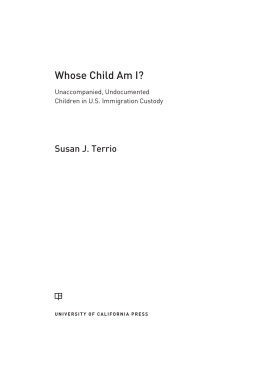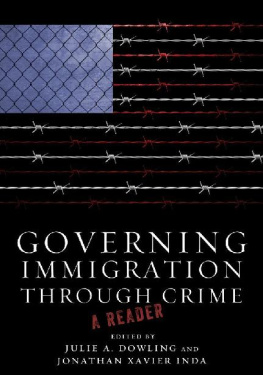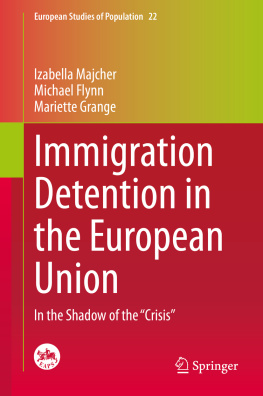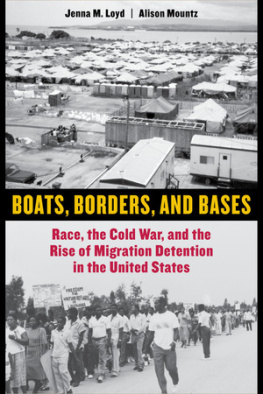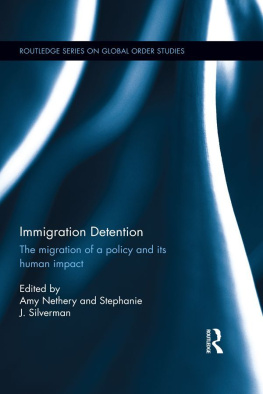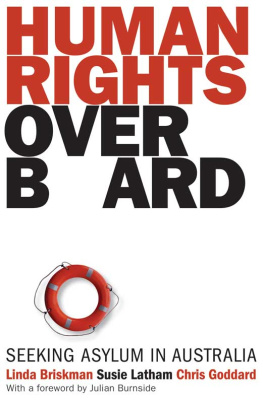Acknowledgments
In researching this book, I have acquired a number of debts. I am immensely grateful to the Radcliffe Institute at Harvard University whose exploratory summer workshop program helped me launch this project on unaccompanied, undocumented children in U.S. immigration custody. The three-day seminar assembled practitioners and academics with expertise on child migration, refugee populations, and U.S. immigration law. I would like to thank immigration attorneys Barbara Hines, Christopher Nugent, and Aryah Somers and legal scholar Jacqueline Bhabha; migration experts Elzbieta Gozdziac, Susan Coutin, and Cecilia Menjivar; child refugee expert Olivia Faries; child psychiatrist Stuart Lustig; and former chief immigration judge Michael Creppy. I also thank Chief Immigration Judge Brian OLeary, who approved my request to observe immigration court hearings around the country. I also thank my colleague Andy Schoenholtz for allowing me to audit his course on U.S. immigration law and policy at Georgetown Law School in 2010.
A number of practitioners provided invaluable assistance at the outset and throughout my research, steering me to the right sources and contacts. They include immigration judge Dana Leigh Marks; attorneys Michelle Bran and Olga Byrne; child refugee experts Olivia Faries, Hilary Chester, Connie Daniels, Kimberly Haynes, Natalie Lummert, Chak Ng, Kristyn Peck, Anita Prasad, Laura Schmidt, and Dawnya Underwood; consultant Susan Schmidt; and child psychologist Judy Okawa.
Between 2009 and 2012 I made sixteen trips in the United States to visit federal facilities, observe hearings in immigration courts, and attend conferences on undocumented children. The following attorneys at legal service agencies were extremely helpful guides to U.S. immigration courts and the law: in Phoenix, Arizona, Sara Lofland and Alejandra Valdez; in California, Gladys Molina, Kristin Jackson, and Angie Junck; in Miami, Florida Deborah Lee and Michelle Abarca; in New Orleans, Hiroko Kusuda and Laila Hlass; in Chicago, Sarah Diaz, Anita Maddali, and Maria Woltjen; in Boston, Jane Rocamora; in East Lansing, Michigan, David and Veronica Thronson; in Newark, New Jersey, Elissa Steglich and Barbara Camacho; in New York, Abigail Cushing, Alison Kahmi, and Mario Russell; in Harlingen, Texas, accredited representative Lauren Fisher and attorney Carly Salazar; in Houston, Anne Chandler, Dalia Castillo-Granados, Maria Mitchell, and Yasmin Yavar; in San Antonio, Jonathan Ryan; in Seattle, Rebekah Fletcher and Juli Bildhauer; and in Washington, DC, Larry Katzman. I want to express my heartfelt thanks to attorneys Megan McKenna and Daria Fisher Page at Kids in Need of Defense for their help in connecting me with young interviewees and to Wendy Young for sharing her unerring insights and invaluable expertise. I am especially indebted to attorneys Michelle Bran, Jessica Jones, Jennifer Podhul, and Emily Butera, whose ongoing assistance has been indispensable to the success of this project. I interviewed many other attorneys who requested that I not quote them by name. I thank them all for their professionalism, knowledge, and unswerving dedication to serving a vulnerable population.
The Executive Office of Immigration Reviewthe federal agency that oversees the federal immigration courtsdoes not permit sitting judges to speak publicly. Nonetheless, a number of judges discussed, under the cover of anonymity, the challenges of working in the immigration court system and of adjudicating juvenile cases. Their perspective is a critical addition to this study.
I want to express my gratitude to Maureen Dunn, then director of the Division of Unaccompanied Childrens Services at the Office of Refugee Resettlement (ORR), who approved my request to visit federal facilities and to interview staff members. I also thank her colleagues Elaine Kelley and Jallyn Sualog, who assisted with the logistics of on-site visits. Communication liaison Lisa Raffonelli provided comprehensive statistics on ORR admissions, staffing, and release for 2012 and 2013. I interviewed supervisors, case managers, clinicians, teachers, and youth care workers acting under contract to the government. I appreciate their time and candid commentaries on everyday life in the custodial system. Most of them declined to be quoted by name, so I identify only those staff members who had retired or changed jobs or specifically agreed to be identified.
I am particularly indebted to the social workers from the Safe Haven program at the Lutheran Immigration and Refugee Services who worked under contract to the government until September 30, 2010. They drove me to far-flung facilities, explained arcane regulations, and permitted me to observe the interviews they conducted with detained youth. For their extraordinary generosity I would like to acknowledge Jasmin Hernandez, Zrinka Ivkovic, Aileen Moore, Alexandra Peralta, Annaken Toews, Michaela Vergara, and Lauren Wichterman. I am also indebted to the many child welfare experts I interviewed at the United States Conference of Catholic Bishops. I also want to thank the directors and staff of federal foster care and unaccompanied refugee minor programs in Phoenix, Arizona; Worcester, Massachusetts; Grand Rapids and East Lansing, Michigan; Richmond, Virginia; and Seattle and Tacoma, Washington, who graciously agreed to organize my on-site visits and arranged for interviews with local foster parents, formerly detained young people, attorneys, social workers, clinicians, and school officials.

